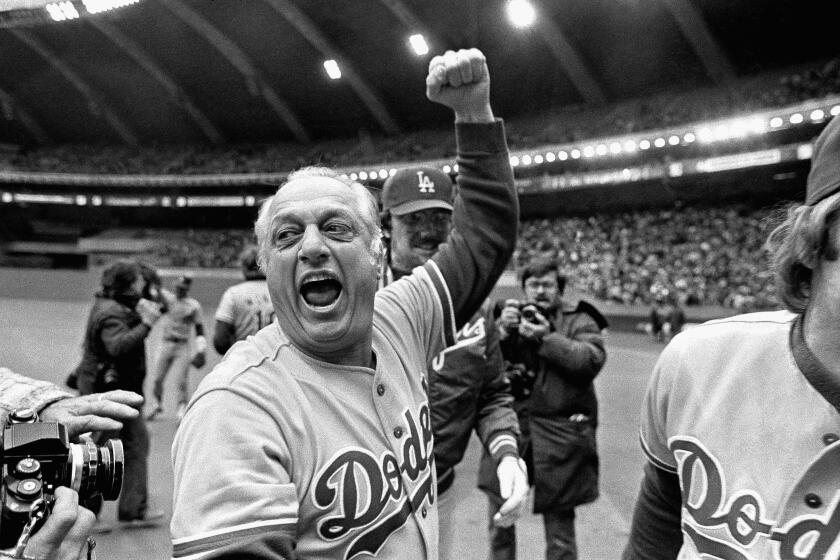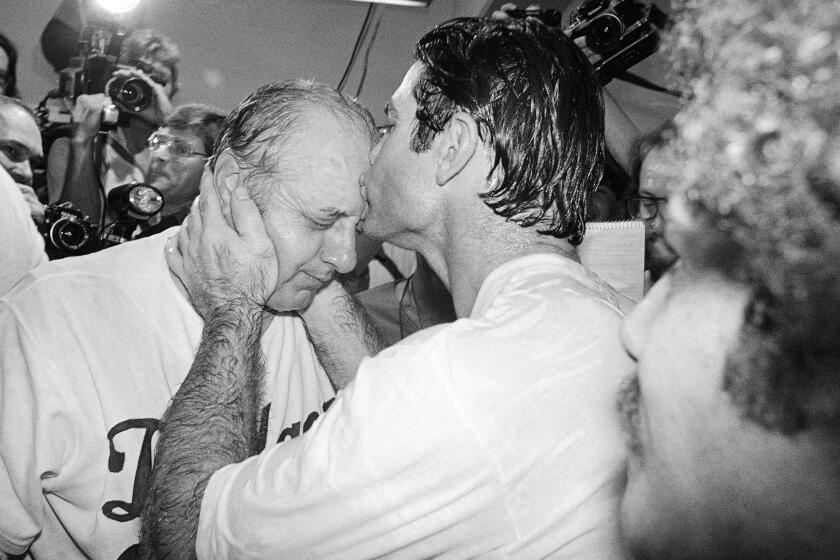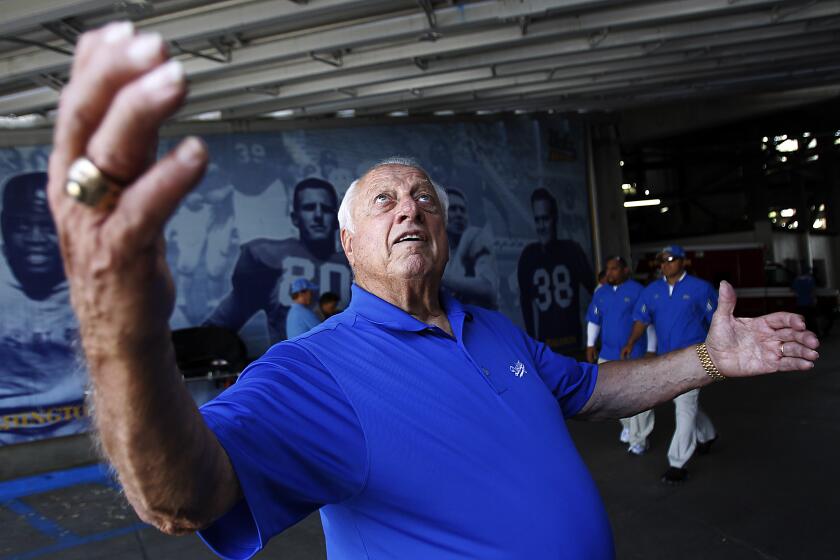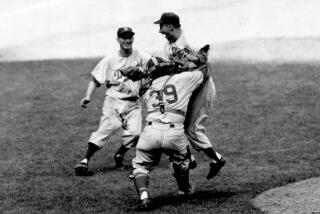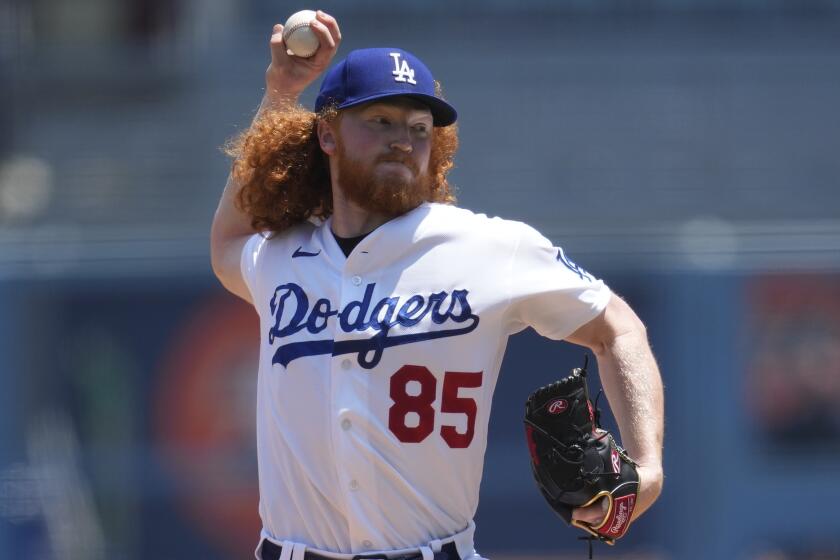Dodgers manager Tommy Lasordaâs five most memorable seasons
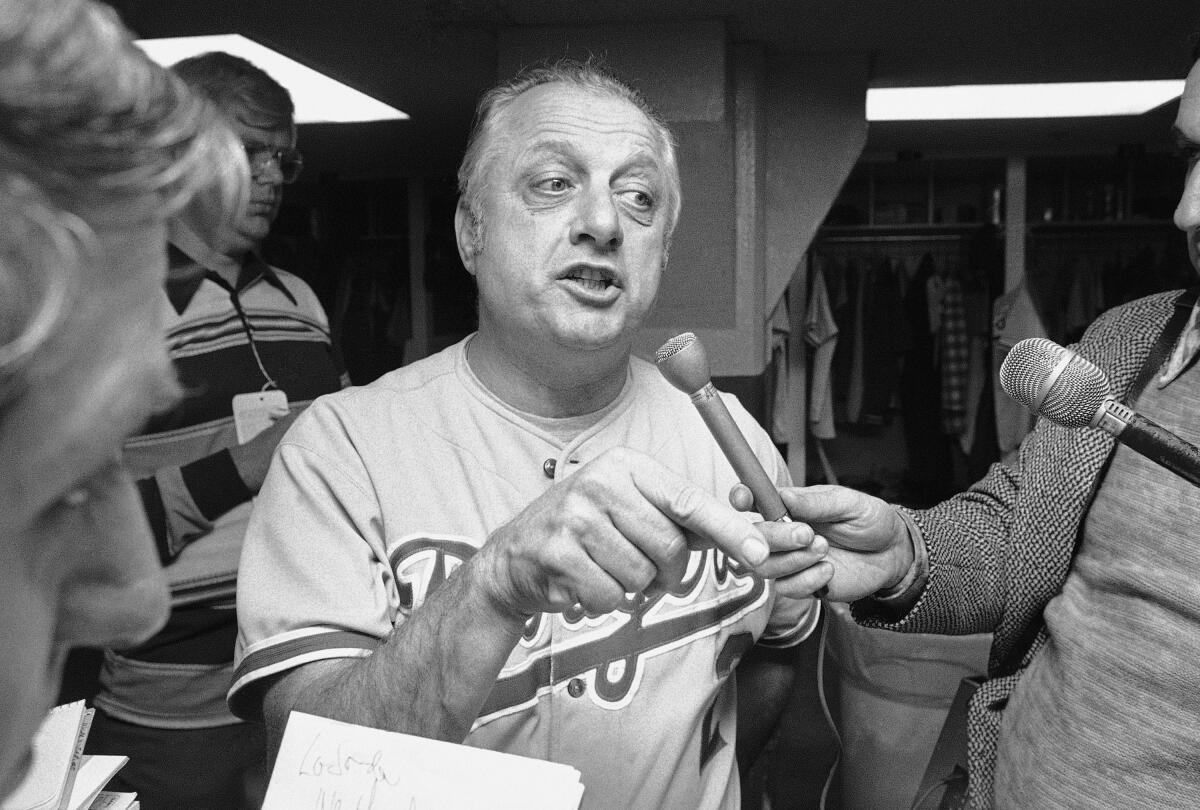
Tommy Lasordaâs undistinguished playing career and extraordinary post-managerial turn as a passionate ambassador for the Dodgers and all of baseball are essential parts of his saga. But it was his expertise as a manager for more than 30 years that earned him a place in the Hall of Fame and in the hearts of generations of players.
Lasorda demonstrated an ability that seems antiquated in todayâs era dominated by statistical probabilities and measurables: to improve the performance of his players through motivational techniques ranging from emotional outbursts to hilarious antics to relentlessly positive bromides.
Lasorda, who died Thursday at age 93, managed Dodgers minor league teams from 1965-72, was a Dodgers coach under manager Walter Alston from 1973-1976 and managed the Dodgers from 1977-1996. As an encore, he managed the 2000 U.S. Olympic team to a gold medal.
A look back at the life of legendary Dodgers manager Tommy Lasorda, who died on Jan. 7, 2021 at the age of 93.
Twenty of his teams had winning records. Here are five that stood out:
1970 Spokane Indians: 94-52, won the triple-A Pacific Coast League North by 26 games and swept the Hawaii Islanders 4-0 in the championship series.

The lineup oozed so much talent that in 1993 Baseball America named it the greatest minor league team of the previous 25 years. Lasorda had managed the core as it rose through the farm system, and within a year or two many were ready for Dodger Stadium: Steve Garvey, Davey Lopes, Bill Russell, Bobby Valentine, Bill Buckner, Tom Paciorek, Tommy Hutton, Charlie Hough and Doyle Alexander.
How much confidence did Lasorda display in the group? He didnât use offensive signs because he trusted the players to think for themselves.
âHe told us that if we demonstrated that we didnât know to take a strike when we were a couple of runs down, or when to drop down a bunt, then weâd have signs,â Hutton said at the time.
A year later Buckner, Valentine, Garvey and Russell were in Los Angeles.
âThat group you saw in Spokane basically bridged the gap in Los Angeles from a team that was the old Brooklyn Dodgers to one that was the real Los Angeles Dodgers,â Garvey said. âAnd Tom was the catalyst.â
1977 Dodgers: 98-64, NL champions, defeating the Phillies in four games before losing to the Yankees in the World Series in six games.

Dodgers defeat the Philadelphia Phillies for the 1977 National League pennant.
Lasordaâs first season as manager marked an abrupt departure from Alstonâs button-down approach. Fred Claire, the teamâs marketing director, took a cue from Lasordaâs impassioned monologues to reporters during spring training and launched a âDodger Blueâ campaign on opening day.
Frank Sinatra sung the national anthem and the Dodgers won, finishing April by winning 15 of 16 and decisively dethroning the two-time defending World Series champion Big Red Machine in the National League.
âIf we could mix the paint properly, I knew Tommy would be the perfect person to spread the blue all over town,â Claire told Dodgers historian Mark Langill. âEverything fell into place.â
Superior depth was evident throughout the season. Reggie Smith, Dusty Baker, Ron Cey and Garvey became the first four teammates in major league history to hit 30 or more home runs.
The belief Lasorda instilled was never more apparent than in Game 3 of the NL championship series when they scored three runs with two out and nobody on in the ninth to defeat Philadelphia 6-5.
1981 Dodgers: 63-47. Beat the Astros in five games in the NLDS; beat the Expos in five games in the NLCS; beat the Yankees in six games in the World Series.

The Dodgers defeat the New York Yankees in the 1981 World Series.
Just as Lasorda launched into one of his textbook paeans to the Dodgers during a postgame interview with Bob Uecker after the World Series win, young star Pedro Guerrero dumped an entire bottle of champagne on the managerâs head.
Lasordaâs eyes stung so badly he stopped talking long enough for commissioner Bowie Kuhn to step in and award the championship trophy to impeccably dressed owner Peter OâMalley, general manager Al Campanis and the sopping wet Lasorda, who had license to play practical jokes on Guerrero for years to come.
The Dodgersâ trips to the World Series under Lasorda in 1977 and 1978 ended in losses to the Yankees. Three years later in a season marred by a playersâ strike, they defeated the Yankees for their first World Series title since 1965.
The accomplishments of Tommy Lasorda were numerous and varied, and nearly all of them revolved around his 71 years with the Dodgers.
Fernando Valenzuela on the mound and Mike Scioscia behind the plate were exciting new faces, and Guerrero and Bob Welch emerged as stars.
The mix of veteran leadership and youthful vigor was underscored when Guerrero, Cey and Steve Yeager were named tri-MVPs of the World Series.
1988 Dodgers: 94-67; beat the Mets in the NLCS in seven games and the Athletics in the World Series in five games.

The Dodgers defeat the Oakland Athletics to win the 1988 World Series.
The most iconic moment, of course, was a hobbling Kirk Gibsonâs walkoff home run in Game 1 of the World Series, a beaming Lasorda bounding out of the dugout with his arms raised.
Yet the entire regular season set a benchmark for overachievement. The Dodgers won 94 games despite batting .248 and ranking eighth in the NL with 99 home runs (for comparison, in 2020 they hit 118 homers in only 60 games). Starter Orel Hershiser was a star, but Valenzuelaâs arm was dead after six consecutive seasons of more than 250 innings, and future Hall of Famer Don Sutton was 43 and mostly ineffective.
Surprises continued in the NLCS when the Dodgers defeated the heavily favored Mets in seven games. And triggered by the unforgettable swing by Gibson, the Dodgers rolled through the Aâs and Lasorda had the crowning achievement of his 20-year Dodgers managerial career.
2000 Olympics: Gold medal

USA Baseball wins gold at the 2000 Summer Olympic Games in Sydney.
The overwhelming favorite to win the eight-team tournament was Cuba, which entered the competition 18-0 in winning gold medals in 1992 and 1996.
Professional players were allowed for the first time, but major leaguers couldnât participate because the Olympics took place during the summer. The roster consisted of mostly marginal prospects and aging catcher Pat Borders, who hadnât played 100 games in a season since 1993.
Lasorda had retired from managing the Dodgers after heart problems during the 1996 season, but he didnât hesitate to accept the offer to manage the U.S. team. The players were all ears and in need of confidence, an ideal petri dish for Lasordaâs assertive and unbridled enthusiasm.
The U.S. beat Japan in 13 innings, the longest game in Olympics history, in pool play, and advanced to the semifinals despite losing to Cuba 6-1. The U.S. defeated South Korea on a walkoff homer by Doug Mientkiewicz in the ninth to earn a rematch against Cuba in the gold medal game.
Tommy Lasorda, who died Thursday at age 93, viewed his accomplishments across 71 years with the Dodgers through an unconventional lens.
Ben Sheets, who went on to a solid MLB career, defeated Cuba by pitching a three-hit shutout, but not before pulling a prank on Lasorda.
The night before the game, Lasorda took Sheets to dinner and told him he was about to pitch the biggest game of his life. Sheets gave his manager a blank look and replied, âWho are we playing?â
Lasorda could take a joke as well as he could deliver one, and he could motivate his players to an extent rarely seen in the history of baseball. The results speak for themselves.
More to Read
Are you a true-blue fan?
Get our Dodgers Dugout newsletter for insights, news and much more.
You may occasionally receive promotional content from the Los Angeles Times.
